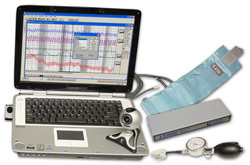
Marisa Taylor reports for McClatchy on a flaw affecting the Lafayette Instrument Company’s LX4000 polygraph system, which is widely used by federal, state, and local government agencies. Excerpt:
WASHINGTON — Police departments and federal agencies across the country are using a type of polygraph despite evidence of a technical problem that could label truthful people as liars or the guilty as innocent, McClatchy has found.
As a result, innocent people might have been labeled criminal suspects, faced greater scrutiny while on probation or lost out on jobs. Or, just as alarming, spies and criminals may have escaped detection.
The technical glitch produced errors in the computerized measurements of sweat in one of the most popular polygraphs, the LX4000. Although polygraphers first noticed the problem a decade ago, many government agencies hadn’t known about the risk of inaccurate measurements until McClatchy recently raised questions about it.
The manufacturer, Lafayette Instrument Co. Inc., described the phenomenon as “occasional” and “minor,” but it couldn’t say exactly how often it occurs. Even after one federal agency became concerned and stopped using the measurement and a veteran polygrapher at another witnessed it repeatedly change test results, the extent and the source of the problem weren’t independently studied nor openly debated. In the meantime, tens of thousands of Americans were polygraphed on the LX4000.
The controversy casts new doubt on the reliability and usefulness of polygraphs, which are popularly known as lie detectors and whose tests are banned for use as evidence by most U.S. courts. Scientists have long questioned whether polygraphers can accurately identify liars by interpreting measurements of blood pressure, sweat activity and respiration. But polygraphers themselves say they rely on the measurements to be accurate for their daily, high-stakes decisions about people’s lives.
“We’re talking about using a procedure that has a very weak scientific foundation and making it worse,” said William Iacono, a University of Minnesota psychology professor who’s researched polygraph testing. “I already don’t have very much confidence in how government agencies conduct these tests. Now, they might as well be flipping a coin.”
 Indeed, given polygraphy’s lack of scientific underpinnings, the issues with the LX4000 may have much the same effect on the accuracy of polygraph chart readings as imperfections in crystal balls have on the accuracy of fortune-tellings. Emeritus professor of psychology John J. Furedy has likened polygraphy to the ancient divination ritual of entrails reading, and retired FBI supervisory special agent Dr. Drew Richardson has observed that polygraphers are involved in the detection of deception “to the extent that one who jumps from a tall building is involved in flying.”
Indeed, given polygraphy’s lack of scientific underpinnings, the issues with the LX4000 may have much the same effect on the accuracy of polygraph chart readings as imperfections in crystal balls have on the accuracy of fortune-tellings. Emeritus professor of psychology John J. Furedy has likened polygraphy to the ancient divination ritual of entrails reading, and retired FBI supervisory special agent Dr. Drew Richardson has observed that polygraphers are involved in the detection of deception “to the extent that one who jumps from a tall building is involved in flying.”
Creo que estan locos, especialmente el dueño de esta pagina es un desocupado, yo personalmente no tengo tiempo para estar escribiendo pero este vago desocupado se preocupa, solo el sabra sobre su historia y la razón por la que se dedica a desprestigiar a una ciencia que lo ha puesto al descubierto sobre sus comportamientos deshonestos cuando fue evaluado…